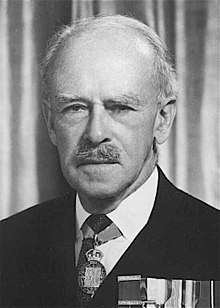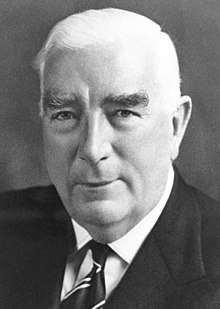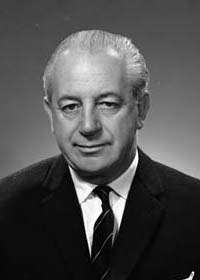1966 in Australia
The following lists events that happened during 1966 in Australia.
| 1966 in Australia | |
|---|---|
| Monarchy | Elizabeth II |
| Governor-General | Lord Casey |
| Prime minister | Sir Robert Menzies, then Harold Holt |
| Population | 11,599,498 |
| Elections | QLD, Federal |
| |||||
| Decades: |
| ||||
|---|---|---|---|---|---|
| See also: | |||||
Incumbents
- Monarch – Elizabeth II
- Governor-General – Lord Casey
- Prime Minister – Sir Robert Menzies (until 26 January), then Harold Holt
- Opposition Leader – Arthur Calwell
- Chief Justice – Sir Garfield Barwick
State and Territory Leaders
- Premier of New South Wales – Robert Askin
- Premier of Queensland – Frank Nicklin
- Opposition Leader – Jack Duggan (until 11 October), then Jack Houston
- Premier of South Australia – Frank Walsh
- Opposition Leader – Sir Thomas Playford IV (until 13 July), then Steele Hall
- Premier of Tasmania – Eric Reece
- Premier of Victoria – (Sir) Henry Bolte
- Premier of Western Australia – David Brand
- Opposition Leader – Albert Hawke (until 31 December), then John Tonkin
Governors and Administrators
- Governor of New South Wales – Sir Roden Cutler (from 20 January)
- Governor of Queensland – Colonel Sir Henry Abel Smith (until 18 March), then Sir Alan Mansfield (from 21 March)
- Governor of South Australia – Lieutenant General Sir Edric Bastyan
- Governor of Tasmania – General Sir Charles Gairdner
- Governor of Victoria – Major General Sir Rohan Delacombe
- Governor of Western Australia – Major General Sir Douglas Kendrew
- Administrator of Nauru – Reginald Leydin (until February), then Leslie King (from 3 May)
- Administrator of Norfolk Island – Roger Nott, then Reginald Marsh
- Administrator of the Northern Territory – Roger Dean
- Administrator of Papua and New Guinea – Sir Donald Cleland (until December)
Events
- 26 January –
- Robert Menzies, Australia's longest-serving Prime Minister, retires and is succeeded by Harold Holt.
- The Beaumont children are abducted during a visit to Glenelg beach in Adelaide and are never seen again.
- 14 February – Decimalisation of the Australian currency; the Australian dollar replaces the Australian pound at the rate of ten shillings to the dollar.
- The Australian Workers' Union affiliates with the Australian Council of Trade Unions
- the severe drought which has stricken large areas of Australia since 1957, particularly in rural NSW and Queensland, is finally eased by widespread rains
- Jørn Utzon resigns as architect of the Sydney Opera House, following a bitter struggle with the new Public Works Minister Davis Hughes over fees, costs and design changes
- Jack Brabham is named Australian of the Year
- The first National Service conscripts fly out from Richmond RAAF base in Sydney bound for Vietnam
- 7 April – New South Wales repeals the Sunday Observance Act, allowing theatres and cinemas to open, sporting events to charge admission and clubs to sell alcohol on Sundays.
- 21 June – Federal ALP leader Arthur Calwell is injured in an assassination attempt by 19-year-old Peter Kocan.
- Japan replaces Great Britain as Australia's largest trading partner
- the Council for the Defence of Government Schools (DOGS) is formed in Melbourne
- the Queensland government grants sand mining leases on Fraser Island without holding the required public hearings
- General Motors Holden becomes the first local car manufacturer to install seat belts as standard equipment in all its new vehicles.
- Western Mining Corporation discover rich nickel ore deposits at Kambalda in Western Australia's Goldfields region.
- The Prince of Wales arrives in Australia to attend Geelong Grammar School's exclusive Timbertop preparatory school.
- the Federal government announces the formation of a military Task Force (including conscripts), increasing Australia's commitment to the Vietnam War to 4,500.
- US Vice-President Hubert Humphrey visits Australia to assure the Australian government that the war is being directed by Hanoi and Peking, and that it represents one of China's numerous offensives in Asia
- Victoria extends hotel trading hours from 6pm to 10pm, ending the infamous "Six O'Clock Swill". Driving with a blood alcohol level over 0.05% becomes a criminal offence.
- On advice from Immigration Minister Hubert Opperman, federal cabinet reverses a decision of September 1964, agreeing that non-Europeans could be selected on an individual basis to enter as immigrants with permanent resident status and naturalisation on an equal basis with European applicants
- The Arbitration Commission introduces a minimum weekly wage for adult male employees under federal awards
- Australian forces engage in their first major battle in Vietnam at the Battle of Long Tan, inflicting heavy losses on NLF troops
- 23 August – two hundred Gurindji people walk off Wave Hill Station in the Northern Territory in protest at low wages and poor conditions
- US President Lyndon Johnson arrives for a 3-day visit of Australian east coast cities, sparking rowdy demonstrations by anti-war protesters
- The Liberal Reform Group (which later evolves into the Australian Party) is founded
- Conscientious objector William White is forcibly taken from his home in Sydney and inducted into the army
- Australia negotiates an agreement for an American spy satellite base to be established at Pine Gap in the Northern Territory
- 22 September – Ansett-ANA Flight 149 crashes near Winton, Queensland, killing all 24 people on board.
- 26 November – The Liberal government of Harold Holt scores a massive victory in the 1966 federal election, and is returned to power with the largest majority in the federal parliament's 65-year history.
Science and technology
- Sydney industrial designer Harry Widmer wins the prestigious F.H. Edwards Laurel Award for his design for the Kriesler Mini 41–47 portable radio. The 41-47's innovative polypropylene plastic casing is the first use of this material anywhere in the world in consumer electronics
- Australia's first satellite communications earth station opens at Carnarvon in WA
Arts and literature
- Jon Molvig's portrait of Charles Blackman wins the Archibald Prize
- Fred Williams' Upwey Landscape is awarded the Wynne Prize
- John Cargher's Singers Of Renown begins on ABC Radio; Cargher is still presenting the show in 2007
- both Sydney's and Melbourne's Tivoli Theatres are closed
- Marion Street Theatre opens in Sydney
- Confectionery manufacturer Hoadley's inaugurates Australia's first national pop band competition, the Hoadley's Battle of the Sounds
- Trap by Peter Mathers is awarded the Miles Franklin Literary Award
- Patrick White: The Solid Mandala
- Geoffrey Blainey: The Tyranny of Distance
- The first edition of the pop magazine Go-Set is published in Melbourne
- The Seekers return to Australia for a triumphant concert tour.
- The Rolling Stones return to Australia for their second tour
- Bob Dylan makes his first tour of Australia, supported by The Band
- The Easybeats leave for London
Film
- The Admiral's Cup wins the AFI Best Film award
- Bruce Beresford is appointed secretary of the British Film Institute's Film Production Board
Television
- Gordon Chater wins the Gold Logie
- Play School first aired on 18 July 1966
Sport
- 21 May – Anthony Cook wins the men's national marathon title, clocking 2:20:44.6 in Ballarat.
- St Kilda defeats Collingwood in the VFL Grand Final
- Galilee wins the Melbourne Cup
- NSW yacht Cadence wins the Sydney to Hobart Yacht Race
- The St George Dragons win their 11th consecutive NSWRL premiership defeating the Balmain Tigers
Births
- 1 January – Anna Burke, politician
- 4 February – Tony Butterfield, rugby league player
- 22 February – Brian Greig, politician
- 24 February – David Harris, politician
- 9 March –
- Tony Lockett, AFL football player
- Jonathan O'Dea, politician
- 10 March – Katrina Hodgkinson, politician
- 1 July – Simon Arkell, pole vaulter
- 30 July – Allan Langer, rugby league player
- 3 August – Simon Shirley, decathlete
- 4 September – Gary Neiwand, track cyclist
- 18 December – Melina Bath, politician and schoolteacher
Deaths
- 21 January – Richard Layton Butler (born 1885), Premier of South Australia
gollark: Observe, our end gateway research facility.
gollark: There's one under spawn I think.
gollark: That would be silly. We need to know positions just like everyone else, and you can't use the command computer getBlockPosition thing on a neural interface.
gollark: What about the secret GTech™ dimension accessible only via our hacked end gateway?
gollark: This is not actually working for me.
References
This article is issued from Wikipedia. The text is licensed under Creative Commons - Attribution - Sharealike. Additional terms may apply for the media files.


